|
|
|
Sort Order |
|
|
|
Items / Page
|
|
|
|
|
|
|
| Srl | Item |
| 1 |
ID:
150991


|
|
|
|
|
| Summary/Abstract |
There is a tremendous amount of variation in conflict intensity both across and within civil conflicts. Some conflicts result in huge numbers of battle deaths, while others do not. Conflict intensity is also dynamic. Conflict intensity escalates, de-escalates, and persists. What explains this variation? We take one of the most prominent explanations for the onset and occurrence of civil conflict—variation in economic conditions—and apply it to the intensity and dynamics of civil conflict. Using an instrumental variables strategy and a rich set of empirical models, we find that the intensity of conflict is negatively related to per capita income. We also find that economic conditions affect conflict dynamics, as poorer countries are likely to experience longer and more intense spells of fighting after the onset of conflict.
|
|
|
|
|
|
|
|
|
|
|
|
|
|
|
|
| 2 |
ID:
150996
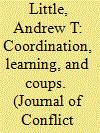

|
|
|
|
|
| Summary/Abstract |
This article proposes a theory of coups that centers around coordination and learning. The military is modeled as many officers who only want to join a coup if others join as well (i.e., coordination). If the current regime has survived past coup attempts, it is common knowledge that it is relatively strong (i.e., learning). Combining these effects, once the regime survives the first period, officers know that the regime is strong enough that they may refrain from staging a coup—regardless of how dissatisfied they may become with the status quo—under the mutually enforcing expectation that no other officer will rebel. The model has other equilibria where coup attempts can occur after the first period, allowing for more detailed empirical predictions. The analysis highlights several reasons why new regimes are prone to coups, but among regimes surviving the initial turmoil, structural factors that would seem to predict coup attempts can have an ambiguous effect. The model also makes novel predictions about how the “initial conditions” of a regime as well as what kinds of changes to payoffs affect the likelihood of coups.
|
|
|
|
|
|
|
|
|
|
|
|
|
|
|
|
| 3 |
ID:
150993
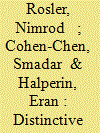

|
|
|
|
|
| Summary/Abstract |
The goal of the current research was to examine how discrete positive intergroup emotional phenomena affect conflict-related attitudes in different contexts of intractable conflict. We hypothesized that empathy, but not hope would be negatively associated with aggressive attitudes during escalation, while hope, but not empathy would be associated with conciliatory attitudes during de-escalation. In study 1, we examined our hypotheses within a correlational design in an emotion-inducing context, while in study 2 a two-wave survey was conducted during real-life events within the context of the Israeli–Palestinian conflict; a peace summit as well as a war. Both studies supported our hypotheses, thus indicating the unique, yet complimentary, contribution of each of the two emotional phenomena to the advancement of peace.
|
|
|
|
|
|
|
|
|
|
|
|
|
|
|
|
| 4 |
ID:
150990


|
|
|
|
|
| Summary/Abstract |
This study compared the effects of three interventions and a no-intervention control on the settlement of resource and value conflicts. These variables were arranged in a two (conflict issue: resources vs. values) by four (no intervention vs. other affirmation vs. shared identity vs. transaction costs) between-dyads design in which 127 dyads engaged in a negotiation task. Negotiators reached generally lower joint outcomes in the value conflict compared to the resource conflict, but after the other-affirmation intervention, this pattern was reversed. The shared-identity intervention did not result in higher joint outcomes for value conflicts. Stressing positive concern for the other negotiator may be a more effective strategy than stressing commonalities between the parties: increased concern for self and decreased defense of own opinions may account for this result. Forcing and logrolling behavior are shown to be mediating variables between the type of conflict and outcomes.
|
|
|
|
|
|
|
|
|
|
|
|
|
|
|
|
| 5 |
ID:
150992
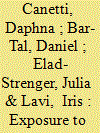

|
|
|
|
|
| Summary/Abstract |
Does ongoing exposure to political violence prompt subject groups to support or oppose compromise in situations of intractable conflict? If so, what is the mechanism underlying these processes? Political scholarship neither offers conclusive arguments nor sufficiently addresses individual-level forms of exposure to violence in the context of political conflict, particularly the factors mediating political outcomes. We address this by looking at the impact of exposure to political violence, psychological distress, perceived threat, and ethos of conflict on support for political compromise. A mediated model is hypothesized whereby exposure to political violence provokes support for the ethos of conflict and hinders support for compromise through perceived psychological distress and perceived national threat. We examined representative samples of two parties to the same conflict: Israelis (N = 781) and Palestinians from Gaza, East Jerusalem, and the West Bank (N = 1,196). The study’s main conclusion is that ethos of conflict serves as a mediating variable in the relationship between exposure to violence and attitudes toward peaceful settlement of the conflict.
|
|
|
|
|
|
|
|
|
|
|
|
|
|
|
|
| 6 |
ID:
150994
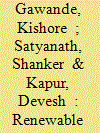

|
|
|
|
|
| Summary/Abstract |
An interesting stream of the civil conflict literature has identified an important subset of civil conflicts with disastrous consequences, that is, those that emerge as a consequence of shocks to renewable natural resources like land and water. This literature is, however, reliant on qualitative case studies when claiming a causal relationship leading from renewable resource shocks to conflict. In this article, we seek to advance the literature by drawing out the implications of a well-known formal model of the renewable resources–conflict relationship and then conducting rigorous statistical tests of its implications in the case of a serious ongoing civil conflict in India. We find that a one standard deviation decrease in our measure of renewable resources increases killings by nearly 60 percent over the long run.
|
|
|
|
|
|
|
|
|
|
|
|
|
|
|
|
| 7 |
ID:
150995
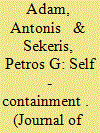

|
|
|
|
|
| Summary/Abstract |
In anarchic settings, potential rivals can be dragged into arms races degenerating in open wars out of mutual suspicion. We propose a novel commitment device for contestants to avoid both arming and fighting. We assume that the military decides the armament levels of a country, while the civilian decides whether to attack a rival country. When these decision-making bodies perfectly communicate, the decision makers are unable to credibly communicate to their foe their willingness not to arm and not to attack, thus implying that war ensues. With imperfect information, however, peace may ensue as countries credibly signal to their rival a more peaceful stance since contestants are more reluctant to enter in an armed confrontation with a potentially understaffed army. Using data on the 1975 to 2001 period, we provide supportive evidence that in countries where the head of the state or the defense minister are military officers, and are therefore better informed of their armies’ fighting preparedness, the likelihood of observing an international conflict is higher.
|
|
|
|
|
|
|
|
|
|
|
|
|
|
|
|
| 8 |
ID:
150989


|
|
|
|
|
| Summary/Abstract |
Once a set of civil war actors reach a final peace agreement, a number of different implementation sequences are possible as the negotiated provisions are put into practice. We focus on a key but threatening stepping stone in the post-accord period—the holding of the first post-accord election—which has the capacity to be a stabilizing or destabilizing force. We identify effective accommodation provisions that civil war actors can negotiate and implement before the first post-accord election to reduce the chances of renewed violence. Utilizing new longitudinal data on the implementation of comprehensive peace agreements between 1989 and 2012 and a series of survival models, we find that if the first post-accord election is preceded by the implementation of accommodation measures, elections can have a peace-promoting effect. However, in the absence of preelection accommodation measures, elections are much more likely to be followed by peace failure
|
|
|
|
|
|
|
|
|
|
|
|
|
|
|
|
|
|
|
|
|